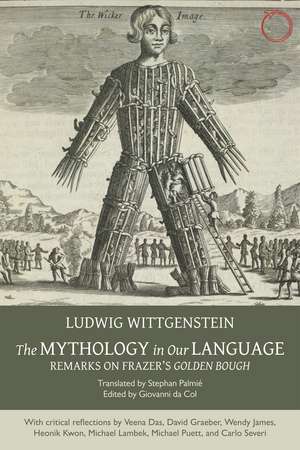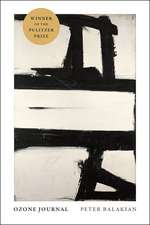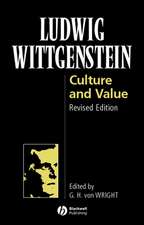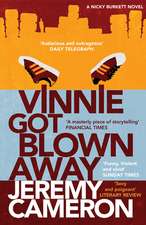The Mythology in Our Language: Remarks on Frazer's Golden Bough
Autor Ludwig Wittgenstein Traducere de Stephan Palmié Editat de Giovanni Da Colen Limba Engleză Paperback – mai 2020
Wittgenstein’s remarks on ritual, magic, religion, belief, ceremony, and Frazer’s own logical presuppositions are as lucid and thought-provoking now as they were in Wittgenstein’s day. Anthropologists find themselves asking many of the same questions as Wittgenstein—and in a reflection of that, this volume is fleshed out with a series of engagements with Wittgenstein’s ideas by some of the world’s leading anthropologists, including Veena Das, David Graeber, Wendy James, Heonik Kwon, Michael Lambek, Michael Puett, and Carlo Severi.
Preț: 215.23 lei
Nou
Puncte Express: 323
Preț estimativ în valută:
41.18€ • 44.88$ • 34.70£
41.18€ • 44.88$ • 34.70£
Carte disponibilă
Livrare economică 03-17 aprilie
Livrare express 19-25 martie pentru 25.33 lei
Preluare comenzi: 021 569.72.76
Specificații
ISBN-13: 9780990505068
ISBN-10: 0990505065
Pagini: 264
Dimensiuni: 152 x 229 x 23 mm
Greutate: 0.4 kg
Editura: HAU
Colecția HAU
ISBN-10: 0990505065
Pagini: 264
Dimensiuni: 152 x 229 x 23 mm
Greutate: 0.4 kg
Editura: HAU
Colecția HAU
Notă biografică
Ludwig Wittgenstein (1889–1951) was arguably the most influential philosopher of the twentieth century. Giovanni da Col is a research fellow in the Department of Anthropology at the University of Oslo and the founder of HAU Books and HAU: Journal of Ethnographic Theory. Stephan Palmié is professor of anthropology at the University of Chicago and the author of many books, including The Cooking of History, published by the University of Chicago Press.
Cuprins
Chapter 1: Translation is Not Explanation: Remarks on the Intellectual History and Context of Wittgenstein’s Remarks on Frazer
Stephan Palmie´
Chapter 2: Remarks on Frazer’s The Golden Bough
Ludwig Wittgenstein, translated by Stephan Palmie´
Chapter 3: On Wittgenstein’s Remarks on Frazer’s Golden Bough
Carlo Severi
Chapter 4: Wittgenstein’s Spirit, Frazer’s Ghost
Heonik Kwon
Chapter 5: Deep Pragmatism
Knut Christian Myhre
Chapter 6: Wittgenstein Exercise
Wendy James
Chapter 7: Wittgenstein on Frazer
Michael Puett
Chapter 8: Of Mistakes, Errors, and Superstition
Veena Das
Chapter 9: Remarks on Wittgenstein’s Remarks on Frazer’s Golden Bough: Ritual in the Practice of Life
Michael Lambek
Chapter 10: Explanation as a Kind of Magic
Michael Taussig
Chapter 11: On an Anthropological Tone in Philosophy
Sandra Laugier, translated by Daniela Ginsburg
Appendix: Remarks on Wittgenstein and Ritual
Rodney Needham
Stephan Palmie´
Chapter 2: Remarks on Frazer’s The Golden Bough
Ludwig Wittgenstein, translated by Stephan Palmie´
Chapter 3: On Wittgenstein’s Remarks on Frazer’s Golden Bough
Carlo Severi
Chapter 4: Wittgenstein’s Spirit, Frazer’s Ghost
Heonik Kwon
Chapter 5: Deep Pragmatism
Knut Christian Myhre
Chapter 6: Wittgenstein Exercise
Wendy James
Chapter 7: Wittgenstein on Frazer
Michael Puett
Chapter 8: Of Mistakes, Errors, and Superstition
Veena Das
Chapter 9: Remarks on Wittgenstein’s Remarks on Frazer’s Golden Bough: Ritual in the Practice of Life
Michael Lambek
Chapter 10: Explanation as a Kind of Magic
Michael Taussig
Chapter 11: On an Anthropological Tone in Philosophy
Sandra Laugier, translated by Daniela Ginsburg
Appendix: Remarks on Wittgenstein and Ritual
Rodney Needham
Recenzii
“This volume is an important intellectual event—in particular, because of the decisions by the editors to showcase some of the most important anthropological perspectives on this text. This will perhaps be taken as a provocation by philosophers, but for me, the strength of this project lies both in its teaching and in its content: after all, many philosophers, including Wittgenstein, have had no problem proclaiming that they are doing anthropology. It is now anthropology’s turn—as an established discipline in its own right—to take on this text and its significance and provocation for it.”
“Palmié’s new translation of Wittgenstein’s Remarks on Frazer’s “Golden Bough”, joined to a set of super-commentaries by anthropological luminaries, is revelatory. This volume restores Wittgenstein’s Remarks to its own lifeworld. In the process, Wittgenstein’s intervention appears again as necessary, and as necessarily unfinished, today as it was in mid-century. An invigorating, dazzling contribution carried out with rare intellectual care.”
“Wittgenstein’s engagement with Frazer’s "Golden Bough" was one of the most remarkable intellectual encounters of the 20th century. With Frazer, the young discipline of anthropology had staked a claim to hold the secret to answering the question of what it is to be human. Wittgenstein found much in anthropological inquiry that was relevant to his thoughts on language, meaning and understanding, though for that he had to overturn many of Frazer’s fundamental assumptions, out-anthropologising, one might say, the anthropologist This series of commentaries brilliantly demonstrates how crucial the issues raised in this exchange remain.”






